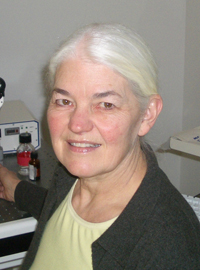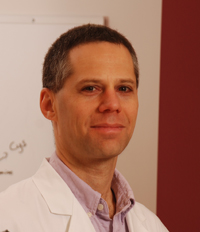 |
Peggy Wheelock, Ph.D. |
 |
Steve Caplan, Ph.D. |
Having two high profile researchers as your mentors for five years is unheard of. But that is exactly the winning formula Peggy Wheelock, Ph.D., said led to the success of seven junior investigators at UNMC to obtain their own RO1 grants from the National Institutes of Health (NIH).
This success has led to the NIH approving a renewal of Dr. Wheelock’s Centers of Biomedical Research Excellence (CoBRE) grant for another five years at $10.9 million.
“The CoBRE grant we received in 2003 has helped us strengthen biomedical research infrastructure in Nebraska, as well as establish a multi-disciplinary thematic center that enhances the research of the investigators involved as evidenced by the success of these seven junior investigators,” said Dr. Wheelock, principal investigator of the CoBRE grant.
Dr. Wheelock said one objective of the renewed funding will be pilot projects to further encourage and support collaborative, multi-disciplinary projects.
“Teaching one how to be a successful, productive scientist is not a trivial task,” said Paula Turpen, Ph.D., director of research resources at UNMC. “The fact that three of the CoBRE mentors (Dr. Wheelock, Robert Lewis, Ph.D., and Keith Johnson, Ph.D.) have been recognized as UNMC Distinguished Scientists in the past two years only confirms the quality of the Center for Cell Signaling mentors. There is no doubt that the seven new NIH-funded junior faculty will continue to benefit from the guidance they received while participating in the CoBRE program.”
Dr. Wheelock, who is a professor of oral biology in the UNMC College of Dentistry, is the director of the Nebraska Center for Cellular Signaling, which was established in 2003 with the initial CoBRE funding. The center focuses on the study of cell signaling and involves multidisciplinary collaboration between researchers.
Researchers from UNMC, the University of Nebraska-Lincoln and Creighton University Medical Center lead five research projects within the grant. Each project involves the study of cellular signaling with a focus on its role in producing tumors.
“The grant has allowed us to bring together outstanding junior and senior faculty with similar interests, which greatly enhances the science knowledge and opportunities for collaboration,” Dr. Wheelock said.
Steve Caplan, Ph.D., assistant professor in the UNMC Department of Biochemistry and Molecular Biology, is one of the seven researchers who is now working with his own funding because of the support he received through the CoBRE grant.
Dr. Caplan joined the grant in 2004 when Dr. Wheelock selected him for a pilot project. He was later asked to become a project leader and was paired with two mentors: Richard MacDonald, Ph.D., UNMC Department of Biochemistry and Molecular Biology, and Dr. Lewis, a professor in the UNMC Eppley Institute.
“They put in a lot of work helping me learn not only how to write better grants, but which study section to submit it to,” Dr. Caplan said. “Peggy also helped, reading through parts of my grant proposals and manuscripts. She really sets the tone for the mentorship part of the grant.”
|
|
While it is basic research, he is collaborating with other researchers who are studying specific protein receptors and want to better understand how proteins move around.
“Hopefully, this helps them better understand their research,” Dr. Caplan said.
Dr. Caplan said he continues to maintain a connection to Dr. Wheelock and the CoBRE grant, even though he no longer qualifies as a CoBRE project leader since obtaining his own funding.
“I try to help out as much as I can with the new investigators coming in, because I believe in what Dr. Wheelock is doing,” Dr. Caplan said. “She is an incredible role model who puts in a huge amount of time on this and still maintains her own lab, all the while worrying about what everyone else who is involved with the grant is doing. She is amazing.”